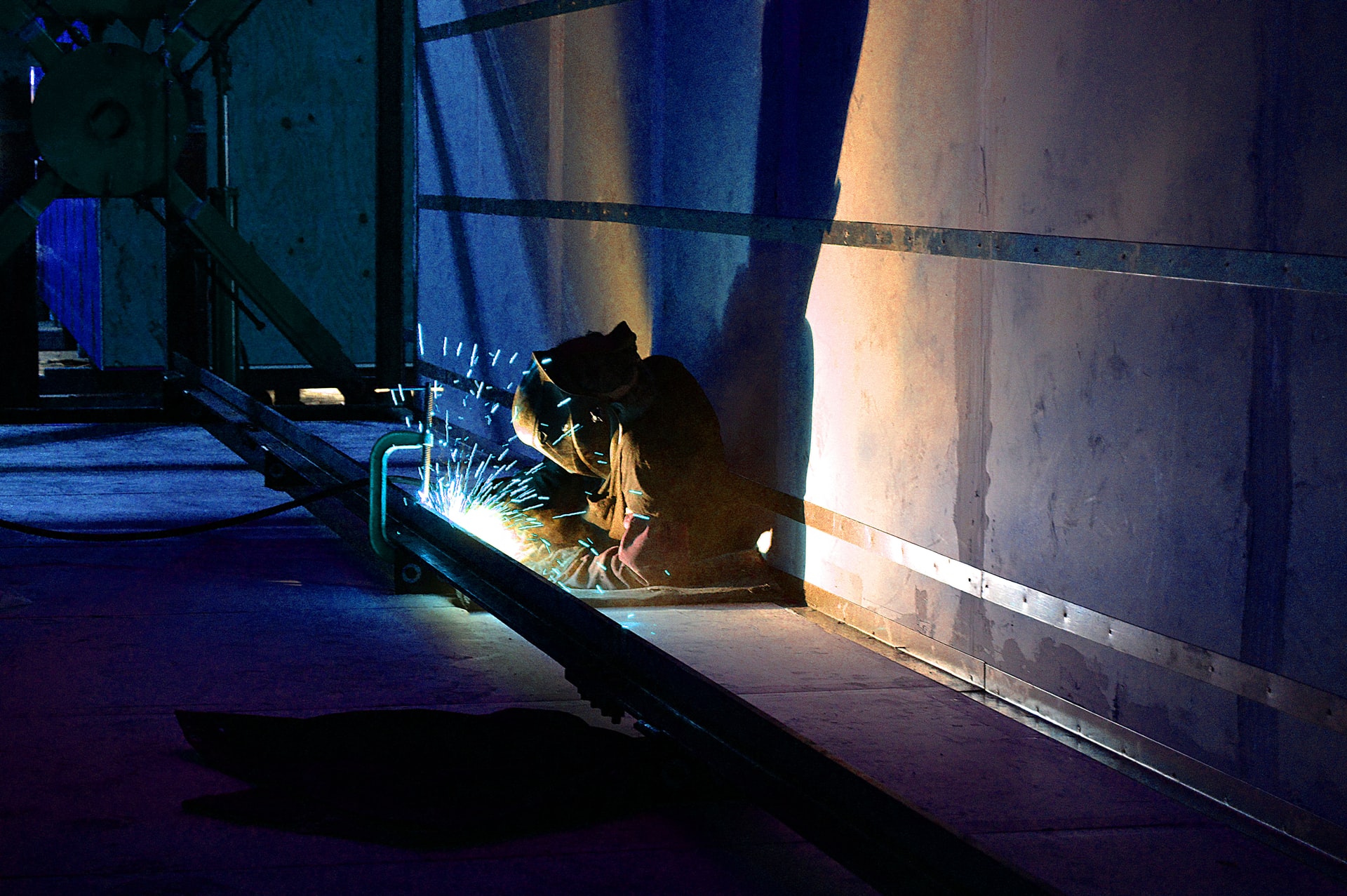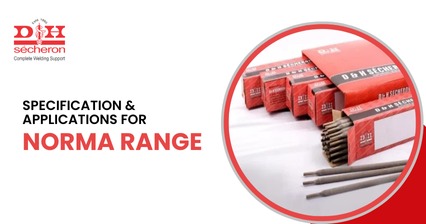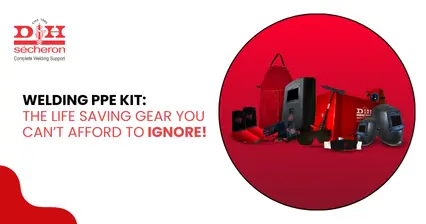As a welder, choosing the right type of weld determines your weld's integrity, depending on many factors like the type of workpiece metal, thickness of metal, welding wire, the equipment, and the right technique used in the process of welding.
MIG welding is the most common welding process out of many welding processes that offer a clean weld and easy to learn for many beginners.
MIG welding is also a good alternative for your fabrication maintenance and repair needs.
The technical name for it is Gas Metal Arc Welding (or GMAW) also know as MIG (Metal Inert Gas) welding is an arc welding process in which a solid MIG wire electrode is passed through a welding gun to create an arc into the weld pool, causing the two base materials to heat, melt, and fuse.

The welding gun protects the weld pool from atmospheric contamination by spraying shielding gas. Common shielding gases used are CO2 apart from argon or argon-helium gases. The welding machine is used through a DC (Direct Current) voltage machine.
The whole welding process can be semi-automatic or automatic. A constant voltage, the direct current power source, is most commonly used with GMAW, but regular current systems, as well as alternating current, can be used.
Here are some advantages to MIG welding:
- Offers ability to join a wide range of metals and thicknesses
- All-position welding capability
- Provides a good weld bead
- Has a minimum of weld splatter
- Easy to learn the process
Applications of MIG welding:
- Industrial sheet metal welding.
- Deep groove welding
Manufacturing Industry: Due to the ease of use of MIG welding, it shows high productivity, which leads to higher profits as it welds metals rapidly and is highly economical.
They are used in the fabrication of pressure vessels and steel structures.

Automotive industry & home improvement industry: Repairs can be done on several different vehicles, whether they are light, heavy, small or large in weight or size, MIG weld creates a dependable and a strong weld even down to 0.5mm, for repair and rebuilding, dismantling, and reassembling with newer and improved parts by preparing the new part or joint by cleaning up the refurbished surface and welding together.
Worn out parts can also be repaired using MIG welding in various coatings like stainless steel, nickel, aluminium, bronze and a range and grade of hardness for a half the price of purchasing a new part.
Welding Pipes: Most common welding of pipes with a consistent weld is achieved by automated MIG Pipe Welding.
MIG welding is also used to fortify worn-out railway tracks' surface: It can even strengthen the filling of worn-out railway tracks. It’s not an easy task to join metals of dissimilar types and variants, but you can achieve it over time by opting for the right filler wire.
We hope these applications give you a better understanding of how MIG welding helps in the creation of automobiles, the building of bridges, among many, and a more efficient way to welding.
Suppose you are looking for an efficient weld with welding wires. In that case, several manufacturers specialize in welding wires in the market, for the best MIG wire, trust D&H Secheron as welding wire manufacturers.
You can reach out to them for all your welding requirements and queries.
01 March 2026 | Welding
An In-Depth Exploration of Low-Alloy Steel: Your Comprehensive Guide
01 March 2026 | Welding
Six-lane expressway of Mumbai-trans-harbour-link (MTHL) connecting Sewri on Mumbai Island
01 March 2026 | Welding
Nagpur - Bori - Tuljapur Road MSH-3 in Yavatmal District (Maharashtra)
01 March 2026 | Welding
3 Tips for Finding the Best Mild Steel Electrode for Your Application
01 March 2026 | Welding
Ways To Prevent Weld Defects When Working With Different Materials
01 March 2026 | Welding
Low Hydrogen Electrodes: Storage, Baking, and Best Practices for High-Quality Welds.jpg)
01 March 2026 | Welding
How to Select the Right Welding Filler Wires for Stainless Steel Welding?
01 March 2026 | Welding
Building the Narendra Modi Stadium with Norma V and Autotherme-1 Electrodes
01 March 2026 | Welding
Understanding Gas Welding: Process, Applications, Advantages & Disadvantages
01 March 2026 | Welding
Low Alloy Steel Welding in a (PEB) Pre Engineered Building Structure
01 March 2026 | Welding
How to Prevent Hydrogen Cracking in Welding: Expert Guide to High-Quality Welds
01 March 2026 | Welding
Welding Rods: Different Types and Tips for Properly Storing and Handling
01 March 2026 | Welding
Tips for Flawless Welds with Stainless Steel Electrodes: Pros and Cons
01 March 2026 | Welding
Exploring Applications and Benefits of Stainless Steel Welding Electrodes
01 March 2026 | Welding
The Complete Welding Machine Maintenance Checklist: Keep Your Equipment Running 24/7
01 March 2026 | Welding
Welding Basics: Joining Metals with Heat and Pressure - A Beginners Guide
01 March 2026 | Welding
Forehand vs. Backhand Welding Techniques: Choosing the Right Method
01 March 2026 | Welding
Welding Innovations to Improve Manufacturing Productivity & Quality.jpg)
01 March 2026 | Welding
Implementation of 96.3 CBM Sarambala medium irrigation scheme at Sawantwadi in Sindhudurg.jpg)
01 March 2026 | Welding
What are Nickel Electrodes? Exploring Varieties and Applications with Real-world Examples
01 March 2026 | Welding
Exploring the World of Welding Consumables: Types and Applications
01 March 2026 | Welding
Choosing the Right Cast Iron Electrode for Different Welding Projects
01 March 2026 | Welding
Distinguishing Low-Alloy Steel from High-Alloy Steel: Understanding the Variations
01 March 2026 | Welding
Hard Facing Wire - Understanding the Process and Achieving Optimal Result
01 March 2026 | Welding
Exploring the Advantages of Stainless Steel Electrodes in Welding Applications
01 March 2026 | Welding
Weathering Steel vs. Traditional Steel: A Comparative Analysis of Performance
01 March 2026 | Welding
Advantages of Submerged Arc Welding (SAW) Welding: Efficiency, Quality, and Cost Savings
01 March 2026 | Welding
Choosing the Right Welding Rod: Why 6013 Electrodes Might Be Your Ideal Option
01 March 2026 | Welding
Why 7018 Electrodes Are Preferred for High-Strength Welds in Pipeline Construction
01 March 2026 | Welding
Understanding Weathering Steel: Characteristics, Advantages, and Common Applications
01 March 2026 | Welding
Filler Wire vs. Stainless Steel Filler Wire: Understanding the Key Differences
01 March 2026 | Welding
What are Mild Steel Electrodes? A Detailed Explanation of Different Types with Examples
01 March 2026 | Welding
Exploring the Impact of Filler Material on Welding Quality and Durability
01 March 2026 | Welding
A Comprehensive Guide to Submerged Arc Welding Wire: Benefits, Uses, Best Practices & More
01 March 2026 | Welding
Benefits of Using Nickel Electrodes in Corrosion-Resistant Welding
01 March 2026 | Welding
Top Advantages of Cast Iron Electrodes for Industrial Welding Applications
01 March 2026 | Welding
Key Benefits and Challenges of Using TIG Welding in Industrial Projects
01 March 2026 | Welding
Lotherme-601: A Game-Changer for Restoring Shoulder Pins in Heavy Machinery
01 March 2026 | Welding
How D&H Sécheron Helped Repair a Rotary Kiln’s Cooler Section with LoTherme 352
01 March 2026 | Welding
Piston Repair for Mining Industry: Cost-Effective Solutions with LoTherme 468.webp)
01 March 2026 | Welding
Top 5 Advantages of Flux Cored Arc Welding for Heavy-Duty Applications.png)
01 March 2026 | Welding
5 Reasons Why 7018 Electrode is the Gold Standard for Welding Professionals
01 March 2026 | Welding
Revitalising Power Plant Efficiency: The Role of LoTherme 470M in Drive Shaft Repairs.webp)




.jpg)




























.jpg)
.jpg)

.jpg)






.jpg)
.jpg)

.webp)
.webp)
.jpg)

















.png)


.webp)

.webp)
.webp)

.webp)

.jpg)











